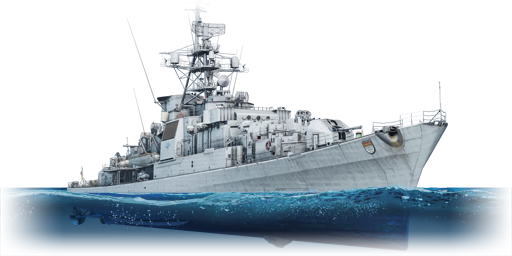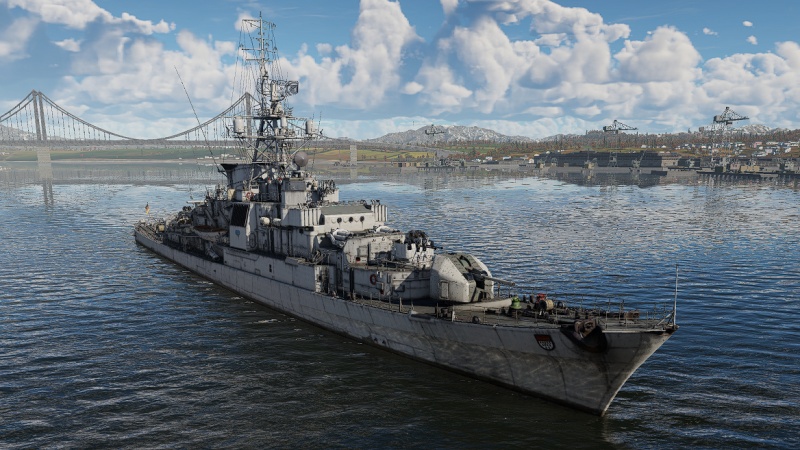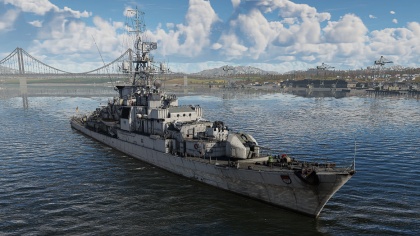Difference between revisions of "Köln F220"
Inceptor57 (talk | contribs) |
|||
| Line 1: | Line 1: | ||
| − | {{Specs-Card|code=germ_frigate_koln}} | + | {{Specs-Card |
| + | |code=germ_frigate_koln | ||
| + | |images={{Specs-Card-Image|GarageImage_{{PAGENAME}}.jpg}} | ||
| + | }} | ||
{{About | {{About | ||
| about = German frigate '''{{PAGENAME}}''' | | about = German frigate '''{{PAGENAME}}''' | ||
| Line 14: | Line 17: | ||
== General info == | == General info == | ||
=== Survivability and armour === | === Survivability and armour === | ||
| + | {{Specs-Fleet-Armour}} | ||
''Talk about the vehicle's armour. Note the most well-defended and most vulnerable zones, e.g. the ammo magazine. Evaluate the composition of components and assemblies responsible for movement and manoeuvrability. Evaluate the survivability of the primary and secondary armaments separately. Don't forget to mention the size of the crew, which plays an important role in fleet mechanics. Save tips on preserving survivability for the "Usage in battles" section. If necessary, use a graphical template to show the most well-protected or most vulnerable points in the armour.'' | ''Talk about the vehicle's armour. Note the most well-defended and most vulnerable zones, e.g. the ammo magazine. Evaluate the composition of components and assemblies responsible for movement and manoeuvrability. Evaluate the survivability of the primary and secondary armaments separately. Don't forget to mention the size of the crew, which plays an important role in fleet mechanics. Save tips on preserving survivability for the "Usage in battles" section. If necessary, use a graphical template to show the most well-protected or most vulnerable points in the armour.'' | ||
=== Mobility === | === Mobility === | ||
| + | {{Specs-Fleet-Mobility}} | ||
''Write about the ship's mobility. Evaluate its power and manoeuvrability, rudder rerouting speed, stopping speed at full tilt, with its maximum forward and reverse speed.'' | ''Write about the ship's mobility. Evaluate its power and manoeuvrability, rudder rerouting speed, stopping speed at full tilt, with its maximum forward and reverse speed.'' | ||
| + | |||
| + | === Modifications and economy === | ||
| + | {{Specs-Economy}} | ||
== Armament == | == Armament == | ||
| + | {{Specs-Fleet-Armaments}} | ||
=== Primary armament === | === Primary armament === | ||
| + | {{Specs-Fleet-Primary}} | ||
{{main|100 mm/55 MLE model 53 (100 mm)}} | {{main|100 mm/55 MLE model 53 (100 mm)}} | ||
| Line 26: | Line 36: | ||
=== Secondary armament === | === Secondary armament === | ||
| + | {{Specs-Fleet-Secondary}} | ||
{{main|40 mm/70 MEL58 (40 mm)}} | {{main|40 mm/70 MEL58 (40 mm)}} | ||
| Line 36: | Line 47: | ||
=== Special armament === | === Special armament === | ||
| + | {{Specs-Fleet-Special}} | ||
{{main|M/50 Bofors|Type 95 depth charge|Mk.6 depth charge}} | {{main|M/50 Bofors|Type 95 depth charge|Mk.6 depth charge}} | ||
''Depth charges, mines, rocket launchers and missiles are also effective in skilled hands and can take an off-guard opponent by surprise. Evaluate the ammunition of this type of armament and rate its performance in combat. If there are no special armaments, remove this section.'' | ''Depth charges, mines, rocket launchers and missiles are also effective in skilled hands and can take an off-guard opponent by surprise. Evaluate the ammunition of this type of armament and rate its performance in combat. If there are no special armaments, remove this section.'' | ||
| + | |||
| + | === Additional armament === | ||
| + | {{Specs-Fleet-Additional}} | ||
| + | ''Describe the available additional armaments of the ship: depth charges, mines, torpedoes. Talk about their positions, available ammunition and launch features such as dead zones of torpedoes.'' | ||
| + | |||
| + | ''If there is no additional armament, remove this section.'' | ||
== Usage in battles == | == Usage in battles == | ||
Revision as of 12:03, 29 December 2020
Contents
| This page is about the German frigate Köln F220. For the light cruiser, see Köln. |
Description
The Köln-class, Köln F220 is a rank V German frigate
with a battle rating of 4.3 (AB/RB/SB). It was introduced in Update 1.97 "Viking Fury".
General info
Survivability and armour
Talk about the vehicle's armour. Note the most well-defended and most vulnerable zones, e.g. the ammo magazine. Evaluate the composition of components and assemblies responsible for movement and manoeuvrability. Evaluate the survivability of the primary and secondary armaments separately. Don't forget to mention the size of the crew, which plays an important role in fleet mechanics. Save tips on preserving survivability for the "Usage in battles" section. If necessary, use a graphical template to show the most well-protected or most vulnerable points in the armour.
Mobility
Write about the ship's mobility. Evaluate its power and manoeuvrability, rudder rerouting speed, stopping speed at full tilt, with its maximum forward and reverse speed.
Modifications and economy
Armament
Primary armament
Provide information about the characteristics of the primary armament. Evaluate their efficacy in battle based on their reload speed, ballistics and the capacity of their shells. Add a link to the main article about the weapon: {{main|Weapon name (calibre)}}. Broadly describe the ammunition available for the primary armament, and provide recommendations on how to use it and which ammunition to choose.
Secondary armament
Some ships are fitted with weapons of various calibres. Secondary armaments are defined as weapons chosen with the control Select secondary weapon. Evaluate the secondary armaments and give advice on how to use them. Describe the ammunition available for the secondary armament. Provide recommendations on how to use them and which ammunition to choose. Remember that any anti-air armament, even heavy calibre weapons, belong in the next section. If there is no secondary armament, remove this section.
Torpedo armament
Torpedo launchers are standard equipment on many ships and boats. Torpedoes are a significant means of defeating an opponent. Evaluate the position of the torpedo launchers, discuss the ammunition available, firing specifics such as dead zones, features of the torpedoes themselves, etc. If there is no torpedo armament, remove this section.
Special armament
Depth charges, mines, rocket launchers and missiles are also effective in skilled hands and can take an off-guard opponent by surprise. Evaluate the ammunition of this type of armament and rate its performance in combat. If there are no special armaments, remove this section.
Additional armament
Describe the available additional armaments of the ship: depth charges, mines, torpedoes. Talk about their positions, available ammunition and launch features such as dead zones of torpedoes.
If there is no additional armament, remove this section.
Usage in battles
Describe the technique of using this ship, the characteristics of her use in a team and tips on strategy. Abstain from writing an entire guide – don't try to provide a single point of view, but give the reader food for thought. Talk about the most dangerous opponents for this vehicle and provide recommendations on fighting them. If necessary, note the specifics of playing with this vehicle in various modes (AB, RB, SB).
Modules
| Tier | Seakeeping | Unsinkability | Firepower | |||
|---|---|---|---|---|---|---|
| I | Dry-Docking | Tool Set | ||||
| II | Rudder Replacement | Fire Protection System | Smokescreen | Auxiliary Armament Targeting | ||
| III | Propeller Replacement | Shrapnel Protection | Ventilation | Improved Rangefinder | Primary Armament Targeting | Depth Charges |
| IV | Engine Maintenance | New Pumps | Ammo Wetting | 100 mm OPF F4 PFHE | 40 mm HE-T-PF | Rocket Launcher |
Pros and cons
Summarise and briefly evaluate the vehicle in terms of its characteristics and combat effectiveness. Mark its pros and cons in the bulleted list. Try not to use more than 6 points for each of the characteristics. Avoid using categorical definitions such as "bad", "good" and the like - use substitutions with softer forms such as "inadequate" and "effective".
Pros:
Cons:
History
The F220 Köln was the first ship out of six of the F120 "Köln" class. This class was one of the first to be built in Germany after World War 2 and the first in the world to feature a CODAG (combined diesel and gas) turbine system, allowing the F120 class ships to move above their cruising speed. Designed as escort ships to protect convoys, the F120 Frigates were specialized for Anti-Submarine Warfare.
F220 "Köln" was laid down by the end of December 1957 and finished about a year later in December 1958. The ship entered service on April 15th, 1961, serving in the 2. Escort Squadron stationed in Cuxhaven and later in the 2. Frigate Squadron stationed in Wilhelmshaven.
After serving in the West German Navy for 21 years, the ship was taken out of service on the 17th December 1982. Since 1989, the "Köln" serves as a hulk in Neustadt (Holstein).
Media
Excellent additions to the article would be video guides, screenshots from the game, and photos.
See also
Links to articles on the War Thunder Wiki that you think will be useful for the reader, for example:
- reference to the series of the ship;
- links to approximate analogues of other nations and research trees.
External links
| Germany frigates | |
|---|---|
| |
Kriegsmarine |
| K-class | K2 |
| |
Bundesmarine |
| Köln-class | Köln · Lübeck |
| |
Volksmarine |
| Pr. 50 | Karl Marx |






